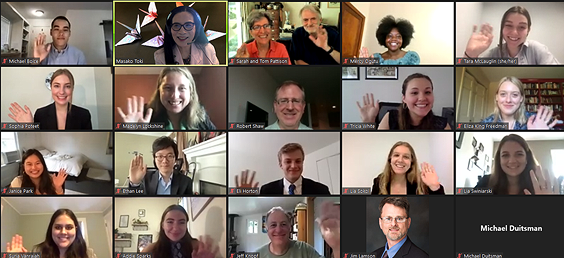August 12, 2021
Masako Toki
The James Martin Center for Nonproliferation Studies (CNS) at the Middlebury Institute of International Studies at Monterey (MIIS) hosted thirteen undergraduate students from around the country for the Summer Undergraduate Fellowship Program this year. The fellowship started on June 7th and each fellow conducted an independent research project with advice from CNS experts. Each fellow presented research findings on August 5th and 6th.

The Summer Undergraduate Fellowship Program proceeded in a fully online format for the second summer in a row due to the ongoing pandemic. Despite this challenging situation, fellows had a valuable educational experience and learned about nonproliferation and disarmament issues by participating in a lecture series, engaging in ongoing CNS projects, and conducting independent research projects. CNS provided these undergraduate students with a unique, academically rigorous, enriching, and innovative program. The research presentation was one of the highlights of the summer program.
The fellows’ research topics covered a wide range of issues including US policy toward North Korea’s nuclear and missile crisis, the Weapons of Mass Destruction Free Zone in the Middle East, historical aspects of biological weapons uses and lessons for the future, biosecurity, Iran’s missile technology, humanitarian impacts of uranium mining, Syria’s chemical weapons, gender and nuclear disarmament, export controls, and an arms control simulation game for high school students. For each fellow’s research summary and presentation, please see the project website.
Each presentation was unique, insightful, well-researched, and innovative. Some fellows are planning to use this research project for their senior thesis for the completion of their bachelor’s degree. Additionally, many of the fellows are also in the process of writing research papers and opinion pieces based on the independent research projects conducted during the fellowship program.
Tom and Sarah Pattison have been supporting the youth-oriented education programs at CNS for many years. The Pattison’s attended both days of the fellow’s presentations along with several CNS experts and MIIS Master of Arts in Nonproliferation and Terrorism Studies’ faculty. All provided useful comments on fellow’s research.
During the closing session, Sarah Pattison mentioned that she was very impressed by the high quality of each fellow’s research presentation as well as their public speaking skills. The second day of presentations occurred on August 6th, coinciding with the 76th anniversary of the dropping of the atomic bomb in Hiroshima. Sarah highlighted the importance of young generations studying this important issue and encouraged all fellows to value and cherish the network and connection established during the fellowship. Regardless of the fellow’s future professional field, Sarah insisted that the education, training, and alumni connections gained from the program will continue to benefit the fellows’ careers.
Although fellows were not able to meet in-person, they were able to foster friendships and bonds with each other while navigating through challenging times as college students in an unprecedented situation.
About the CNS Undergraduate Program
As a part of efforts to promote nonproliferation education among the next generation, CNS started the Summer Undergraduate Fellowship Program in 1997. Since then, fellows have come from a variety of academic majors. The program accepts highly qualified students, domestic and international, and runs from early June through late August.
This year’s summer program is funded by the Tom and Sarah Pattison Fund, CV Starr Foundation, the Howard and Anne Morgens Fund, and the Carnegie Corporation of New York.
